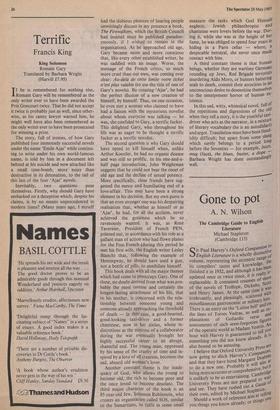Terrific
Francis King
King Solomon Romain Gary Translated by Barbara Wright (Harvill £7.95) If he is remembered for nothing else, Romain Gary will be remembered as the only writer ever to have been awarded the Prix Goncourt twice. That he did not accept it twice is probably just as well, since other- wise, as his canny lawyer warned him, he might well have also been remembered as the only writer ever to have been prosecuted for winning a prize.
The story, full of ironies, of how Gary published four immensely successful novels under the name 'Emile Ajar' while continu- ing to write under his own world-famous name, is told by him in a document left behind at his suicide and now attached like a small time-bomb, more noisy than destructive in its detonation, to the tail of this last of the four 'Ajar' novels.
Inevitably, two questions pose themselves. Firstly, why should Gary have embarked on a deception which, despite his claims, is by no means unprecedented in modern times? (Many years ago, I myself
had the dubious pleasure of hearing people unwittingly discuss in my presence a book, The Firewalkers, which the British Council had insisted must be published pseudon- ymously, if I wished to remain in the organisation). As he approached old age, Gary became more and more conscious that, like every other established writer, he was saddled with an image. Worse, the message of the French critics, so much more cruel than our own, was coming over clear: Au-delti de cette limite votre ticket n 'est plus va/able (to use the title of one of Gary's novels). By creating 'Ajar', he had the perfect illusion of a new creation of himself, by himself. Thus, on one occasion, he even met a woman who claimed to have had a liaison with the mysterious novelist about whom everycne was talking — he was, she confided to Gary, a terrific fucker. This delighted Gary, who throughout his life was as eager to be thought a terrific fucker as a terrific novelist.
The second question is why Gary should have opted to kill himself when, unlike Arthur Koestler, he had no organic disease and was still so prolific. In his one-and-a- half page introduction, John Weightman suggests that he could not bear the onset of old age and the decline of sexual potency. More specifically, close friends have sug- gested the messy and humiliating end of a love-affair. This may have been a strong element in his decision. But my own guess is that an even stronger one was his despairing realisation that, whether as himself or as 'Ajar', he had, for all the acclaim, never achieved the greatness which he so ravenously wanted. It was, as Rene Tavernier, President of French PEN, pointed out, in accordance with his role as a gallant man of action who had flown planes for the Free French (during this period he met his first wife, the English writer Lesley Blanch) that, following the example of Hemingway, he should have used a gun, not a bottle of pills, to annihilate himself.
This book deals with all the major themes which had come to preoccupy Gary. One of these, no doubt derived from what was pro- bably the most intense and certainly the longest-lasting attachment of his life, that to his mother, is concerned with the rela- tionship between someone young and someone already approaching the threshold of death — in this case, a good-hearted, good-looking taxi-driver and a former chanteuse, now in her sixties, whose in- discretions as the mistress of a collaborator during the war eventually brought her highly successful career to an abrupt, shameful end. The young man, oppressed by his sense of the cruelty of time and in- spired by a love of all creation, becomes the sad, absurd old woman's lover.
Another constant theme is the inade- quacy of God, who allows the young to become old, the rich to become poor and the once loved to become desolate. The third major character of the book is an 85-year-old Jew, Solomon Rubinstein, who creates an organisation called SOS, similar to the Samaritans, to fulfil in some small measure the tasks which God Himself neglects. Jewish philanthropist and chanteuse were lovers before the war. Dur- ing it, while she was at the height of her fame, he was obliged to spend four years in hiding in a Paris cellar — where, a despicable betrayal, she never once made contact with him.
A third constant theme is that human beings, whether they are wartime Germans rounding up Jews, Red Brigade terrorists murdering Aldo Moro, or hunters battering seals to death, commit their atrocities in an unconscious desire to desensitise themselves to the omnipresent horror of human ex- istence.
In this sad, witty, whimsical novel, full of the repetitions and digressions of the old when they tell a story, it is the youthful taxi- driver who acts as the narrator, in a mixture of literary vocabulary (he is an autodidact) and argot. Translation must have been fiend- ishly difficult; but apart from some slang which surely belongs to a period long before the Seventies — for example, bozo, mug (face), the blues, buster, a dope Barbara Wright has done outstandinglY well.














































 Previous page
Previous page